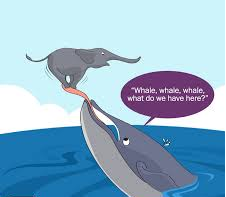Whale beaching, more accurately called Cetacean Stranding is the phenomenon in which cetaceans strand themselves on land (generally beaches). This topic can be asked under the subject Environment & Ecology of General Studies-3 of UPSC Mains of the IAS Exam.
What is Whale Beaching?
Cetaceans are aquatic mammals and include whales, dolphins, and porpoises. Cetaceans that land on beaches generally die of dehydration or other causes like drowning when a high tide shuts their blowhole; or collapsing under their own weight. The reason for such behavior has not been established to an accurate degree. Removing such carcasses becomes a tricky affair since they are generally huge and the decomposing corpses pose a health risk.
To get details on UPSC Environment and Ecology, candidates may check the linked article.

Why Do Whales Get Beached?
The reason for the behavior though has not been established but there are a few factors which can be understood:
| Cause |
Description |
| Water pollution |
- Whales can become sick or poisoned due to pollutant chemicals such as gas and acid, and from the accumulation of daily waste created from everyday living.
|
| Confusion due to man-made Sonar: |
- Some biologists and scientists speculate that whales may become disoriented, sick and confused by the man-made sonar which may interfere with a whale’s brain waves or use of echolocation causing the whale to lose its sense of direction and beach itself.
- The large and rapid pressure changes made by loud sonar can cause hemorrhaging.

|
| Natural diseases |
- Just as humans suffer from sickness and natural diseases marine mammals may also be subject to natural diseases beyond their or our control.
|
| Being Attacked |
- Whales may beach themselves to escape or find cover from shark attacks or attacks from other marine mammals such as the killer whale.
|
| Poison from various aquatic species |
- While it is more difficult to find adequate information regarding whales being poisoned by other aquatic species it is possible that a whale could become poisoned and disoriented causing it to swim to shore.
|
| Changes or abnormalities in the earth’s magnetic field |
- Some biologists believe that abnormalities caused by changes in the earth’s magnetic field may interfere with a whale’s biological navigation causing it to lose its sense of direction.
|
| Changes in the weather and ocean caused by global warming |
- Changes in the tides, melting icebergs and shifting food sources such as fish may force whales to relocate and wander off course causing them to swim into shallow waters or possibly even beach themselves.
|
| “Follow-me” stranding or Intentional |
- In Argentina, killer whales are known to hunt on the shore by intentionally beaching themselves and then lunging at nearby seals before riding the next wave safely back into deeper waters.
- Some stranding may be caused by larger cetaceans following dolphins and porpoises into shallow coastal waters. The larger animals may habituate to following faster-moving dolphins.
- If they encounter an adverse combination of tidal flow and seabed topography, the larger species may become trapped.
|
Also, read UPSC Tips for Environment & Biodiversity in the linked article.
Whale Beaching-Disposal & Health Risks
The task of disposing of the carcasses of whales is a tedious and complicated task:
- If a whale is beached near an inhabited locality, the rotting carcass can pose a nuisance as well as a health risk.
- Such very large corpses are difficult to move.
- The whales are often towed back out to sea away from shipping lanes, allowing them to decompose naturally, or they are towed out to sea and blown up with explosives.
Health Risks:
A beached whale carcass should not be consumed as it causes health risks. Consuming meat from a beached whale can cause botulism and should not be done.
Frequently asked Questions about Whale Beaching
Q1
What is whale beaching?
Cetacean stranding, more commonly referred to as beaching, refers to the phenomenon of dolphins and whales stranding themselves on beaches. Beachings are rare enough that they are not a significant threat to any species. The beaching of a single, live animal is usually the result of sickness or injury.
Q2
Why do whales beach themselves?
Several explanations for why whales strand themselves have been proposed, including changes in water temperatures, peculiarities of whales’ echolocation in certain surroundings, and geomagnetic disturbances, but none have so far been universally accepted as a definitive reason for the behavior. However, a link between the mass beaching of beaked whales and use of mid-frequency active sonar has been found.
Related Links:


Comments